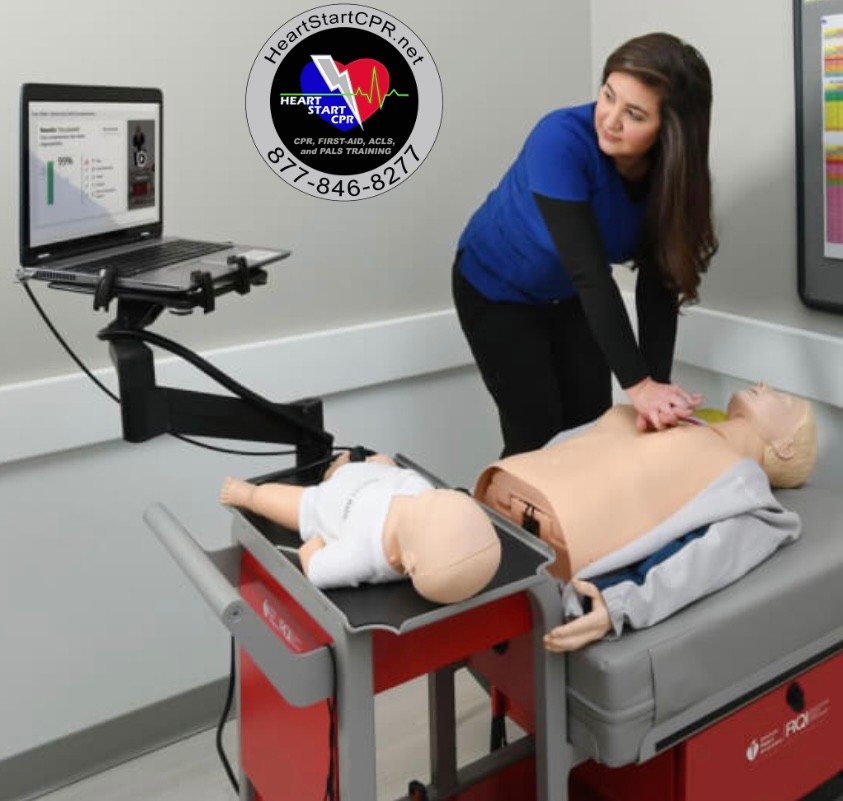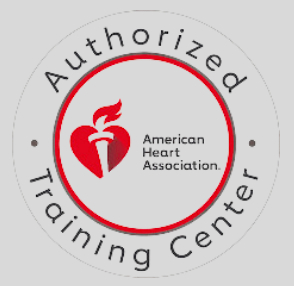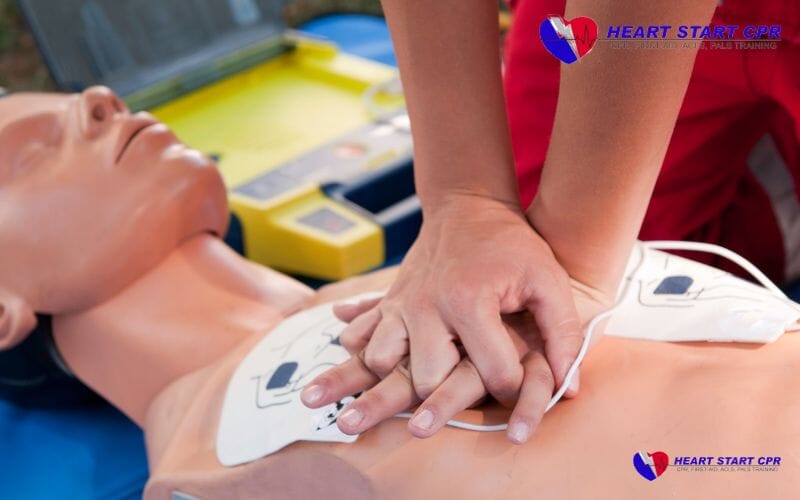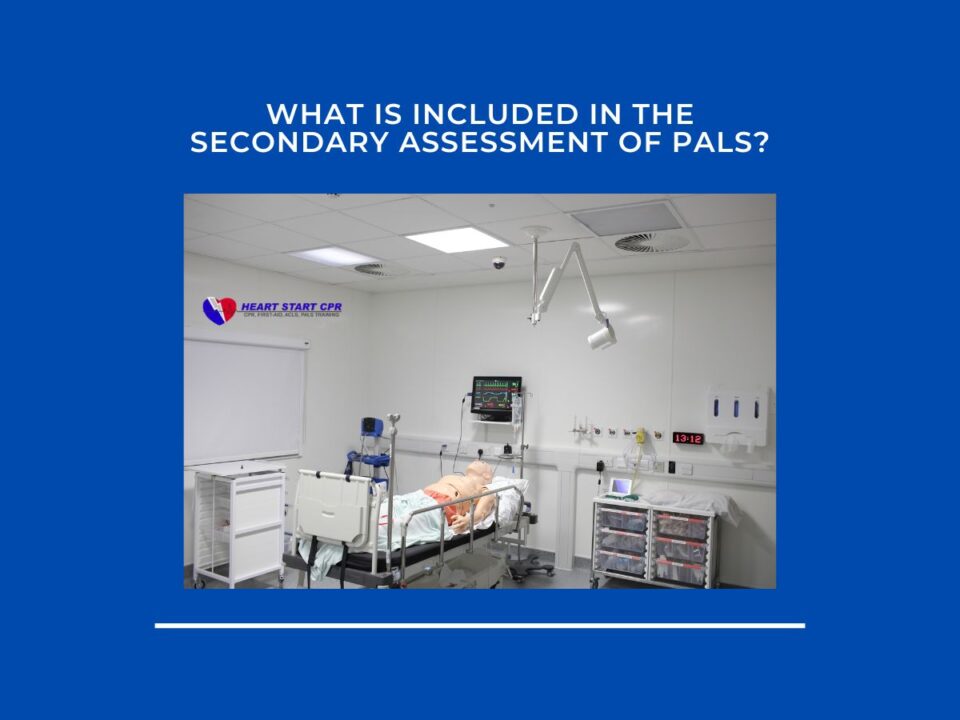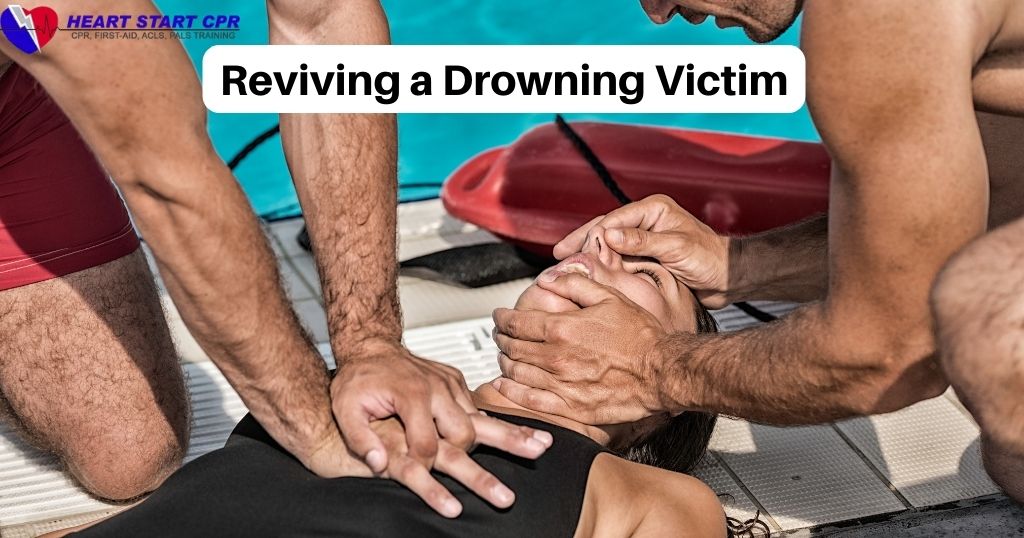
CPR For Drowning Victim: Lifesaving Steps to Know
December 13, 2022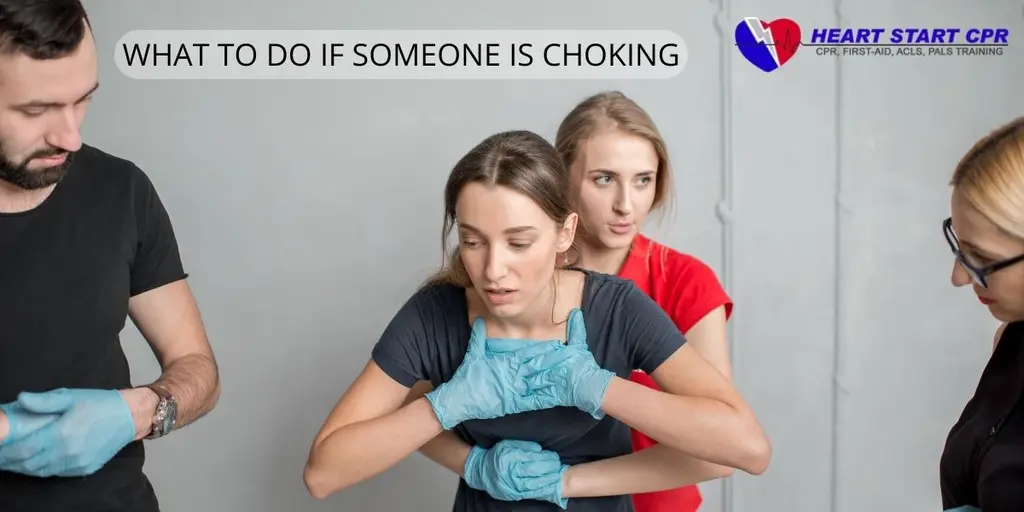
What to Do If Someone Is Choking?
December 16, 2022A heart attack is a life-threatening medical emergency that requires immediate action. It is advised to treat even minor symptoms immediately. Otherwise, the chances of serious heart damage or even death are high. Every 40 seconds, someone has a heart attack in the United States, according to the Centre for Disease Control and Prevention (CDC).
Extreme stress or vigorous activities are directly related to heart attack. If you are a patient with heart disease, the chance of a heart attack is higher. However, heart attacks can occur at any time and any place with anyone. So recognizing and applying prevention for a heart attack at an early stage can prevent the victims from unfortunate events, at least having knowledge of first aid for heart attack can make a difference in life and death. Let’s start with signs and symptoms of heart attack.
Signs And Symptoms Of Heart Attack
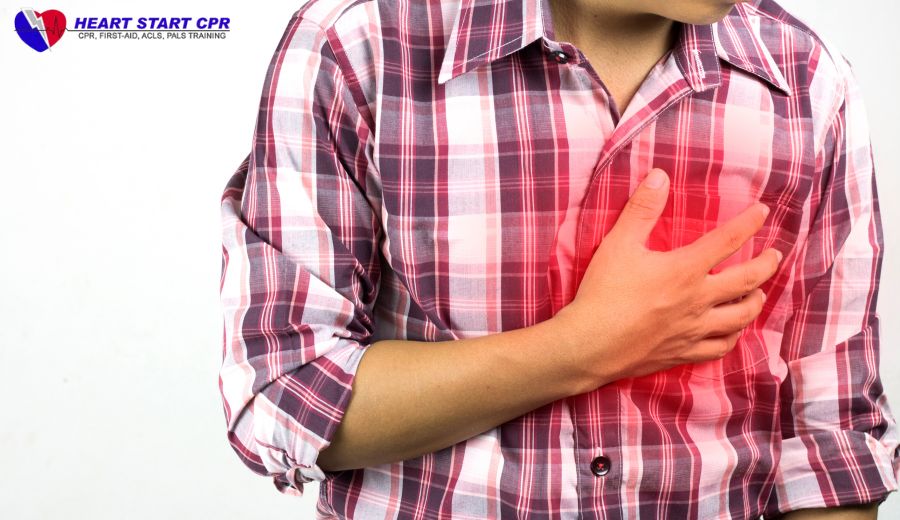
If you experience chest pain for more than 15 minutes, this is a sign that you are having a heart attack. Some people experience mild pain, while others experience severe chest pain. This symptom is usually described as pressure or chest heaviness. But some people do not feel any pain at all. Women will have more vague heart attack symptoms, like shortness of breath, back pain, nausea, or jaw pain.
Although heart attacks occur suddenly, many people show the symptoms an hour or a day in advance. Someone having CPR and First Aid Training may be able to recognize the symptoms early and save the person's life. Some of the significant signs and symptoms people show before a heart attack are discussed below:
- Minor or severe pain in the chest is a sign of a heart attack. Due to the lack of oxygen in the heart, the muscle dies, and a heart attack happens. But sometimes, people don't feel any pain during a heart attack.
- Shortness of breathing occurs while discomfort in the chest may not always be the case. But it can happen before chest discomfort.
- Nausea, back pain, heartburn, and jaw pain, especially in women
- Sweating, laziness, light-headed, or fainting
- Pain in either one or both arms
- You will feel pain from the neck to the upper abdomen.
What to Do When Someone is Having Heart Attack?
A heart attack is a life-threatening medical emergency that requires immediate action. When someone is exhibiting signs of a heart attack, it is critical to know what to do while waiting for professional medical assistance to arrive. The actions taken in the first few minutes can be the difference between life and death. It is important to remain calm, alert emergency responders, make the person as comfortable as possible, and be prepared to provide CPR if needed. The below are the 9 key steps of first aid for heart attack:
- Call emergency services right away - Getting medical help on the way immediately is crucial, as time is critical with a heart attack. Don't delay calling even if symptoms improve.
- Have the person sit or lie down comfortably - This prevents them from moving around unnecessarily and puts less strain on the heart.
- Loosen any tight clothing, provide fresh air - This allows for easier breathing and blood circulation. Tight clothing can restrict this.
- Give aspirin if available to thin blood - Aspirin works as a blood thinner to help prevent clotting which causes heart attacks. It can help minimize damage.
- Monitor breathing, be ready to perform CPR - Watch breathing closely in case it stops, necessitating CPR to keep oxygen pumping. If the person in unconscious start delivering CPR and use AED effectively if available.
- Stay calm, reassure the person - Keeping the person comfortable relieves anxiety and prevents unnecessary stress.
- Keep them as comfortable as possible - This helps reduce heart strain until medical help arrives.
- Even if symptoms improve, call ambulance quickly - Symptoms can come and go, so get expert care en route. Don't delay.
Note: Do not act on your own on the heart medication unless you are a trained medical personal. Learn if the heart attack victim is continuing any heart medication and then only proceed to supply medicine. If unsure it's always wise to wait for the arrival of an emergency medical team.
However, it's crucial to understand that this blog serves as supplementary information and should not replace formal certification and hands-on training in CPR. Enrolling in a certification course remains the best way to acquire the necessary skills and confidence to perform CPR effectively in real-life situations.
What Not to Do When Someone is Having a Heart Attack
It's natural that you will be panicking at the moment and may try out every solution your mind may run. But, you have to keep calm and follow the heart attack first aid. There are some measures you shouldn't apply to a cardiac arrest or heart attack victim.
- Don't ignore the symptoms: Take chest pain, discomfort, or other signs seriously.
- Don't wait it out: Call emergency services immediately (e.g., 911 in the United States).
- Don't make the person exert themselves: Encourage them to rest and keep calm.
- Don't give them anything to eat or drink: This can potentially worsen the situation.
- Don't administer any medication unless prescribed: Only trained medical professionals should provide medication during a heart attack.
- Don't leave the person alone: Stay with them until help arrives, and provide reassurance.
- Don't drive the person to the hospital yourself unless it's absolutely necessary. It's usually safer to wait for an ambulance with trained medical personnel.
- Don't panic: Stay as calm as possible to support the person in distress and help them receive prompt medical attention.
Prevention Of Heart Attack
Let's learn about the risk factors of heart attack before we go through the prevention. Some of the risk factors of heart attack are:
- Age: Men aged 45 and above are most likely to have a heart attack and women of age 55 and above are more at risk of a heart attack.
- Tobacco: Using tobacco products frequently can be a reason of heart attack.
High Blood Pressure: Individuals with a medical history of high blood pressure are at an increased risk of experiencing a heart attack. - Heredity: A family history of heart attacks, even in grandparents or great-grandparents, can share risk due to shared genetic and environmental factors.
Heart Attacks can occur anytime and anywhere, but you can prevent them if you change your lifestyle and follow some measures.
- Smoking doubles your chance of having a cardiac arrest. So avoid smoking or completely stop it.
- Check and maintain your blood sugar levels and cholesterols
- Include exercise in your daily routine
- Maintain a healthy body weight
- Eat healthy food and avoid alcohol intake
CPR Certification At Heart Start CPR
Heart Attack is taking about 800,000 lives every year. Most deaths occur because the victim didn't receive immediate heart attack first aid or proper medical attention in time or the person near them is not trained to provide the essential first aid treatment for heart attack. It shows us the significance of CPR and first aid training in case of emergencies and how it can save lives. Heart Start CPR offers CPR and First Aid Training for people all over California. We offer classroom courses, on-site training, and online classes. Please Call (877) 846-8277 if you have any inquiries regarding our training.
FAQs of Heart Attack First Aid
In a heart attack, it is imperative to take three essential actions promptly. First, immediately dial 911 or the local emergency number to obtain professional medical assistance.
Secondly, administer aspirin by chewing and swallowing it, as this can aid in mitigating the severity of the situation until emergency medical personnel arrive.
Lastly, if the affected individual loses consciousness, initiate cardiopulmonary resuscitation (CPR) to sustain vital functions until advanced medical care is accessible.
This initial response protocol extends the critical intervention window and supports the patient until comprehensive medical attention is secured.
If you are experiencing a heart attack, sit and rest or lie comfortably. Sitting comfortably can help ease the strain on your heart and reduce the workload. While sitting down and resting may provide some relief, the priority should be to seek emergency medical assistance immediately.
If you have been prescribed nitroglycerin and it is accessible, you may take it as directed by your healthcare provider while waiting for emergency services. However, following the guidance of healthcare professionals and emergency responders in your specific situation is crucial.
Several common signs and symptoms may indicate someone is having a heart attack. These include chest pain or discomfort that lasts more than a few minutes, pain or discomfort in other upper body areas like the arms, back, neck, jaw, or stomach, shortness of breath, sweating or breaking out in a cold sweat, sudden lightheadedness or dizziness, and unexplained fatigue or tiredness.
If an individual experiences any of these symptoms, especially acute chest pain, it should be treated as a potential medical emergency. The recommended first aid, as discussed above, is to immediately call emergency services or go to the nearest emergency room for evaluation and treatment, even if the symptoms seem mild. Prompt medical care can prevent further damage to the heart muscle and save lives in the event of a heart attack. Ignoring or delaying treatment puts one at serious risk.
Aspirin is a nonsteroidal anti-inflammatory drug (NSAID) that works by inhibiting cyclooxygenase enzymes, primarily COX-1 and, to a lesser extent, COX-2. These enzymes produce prostaglandins that promote inflammation, pain, and fever.
When you take aspirin, it acetylates and irreversibly inactivates COX enzymes. This stops them from converting arachidonic acid into prostaglandins, resulting in lower levels of prostaglandins and less inflammation and pain.
Aspirin also inhibits platelet aggregation by blocking the production of thromboxane A2 in platelets. This makes the blood less likely to clot, which is why aspirin is used to help prevent heart attacks and strokes in at-risk individuals.
The anti-inflammatory, analgesic (pain relieving), and antipyretic (fever-reducing) effects of aspirin come from the inhibition of COX enzymes and prostaglandins. The anti-clotting effects come from the inhibition of thromboxane.
During a heart attack, a blood clot blocks blood flow to the heart muscle. Aspirin helps prevent these clots from forming by stopping blood cells called platelets from sticking together. It does this by blocking a substance called thromboxane that activates platelets. By keeping platelets from clumping, aspirin helps maintain blood flow in blocked arteries. This can reduce damage to the heart during a heart attack. Aspirin's blood-thinning effect starts working in about 30 minutes and lasts for several hours.

